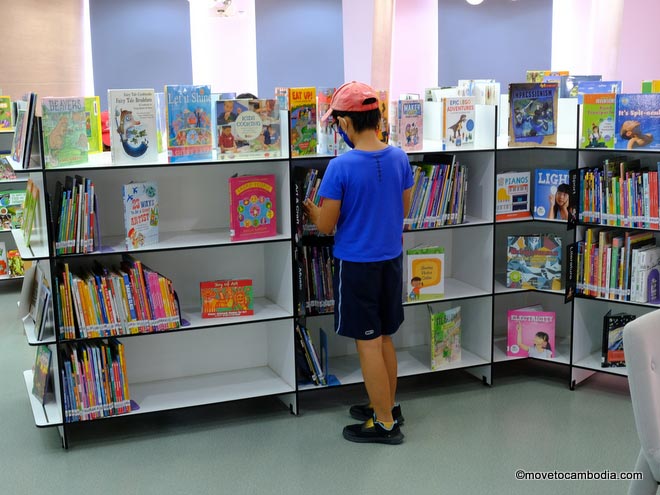Today Lindy Leonhardt the head of admissions at ISPP (a Move to Cambodia advertiser) helps guide new expats through what they should consider when researching and choosing an international school in Cambodia. This post was originally written a few years ago, but Lindy has updated it in 2021 with information for the COVID-19 era.
When researching education options for expatriate children in Cambodia, a newly arrived family might be forgiven for being overwhelmed by the choice of schools available. Even for longer-term residents, the increase in international school offerings over the past few years has changed the education landscape, particularly in Phnom Penh. However, scratch the surface a little and it becomes clearer and the seemingly vast array of options can be reduced to a solid shortlist.

Looking for an international school in Phnom Penh? Here are some things to consider. Photo provided.
So, what should be considered when you are trying to make sense of it all and decide what is best for your child?
It goes without saying that you should put the quality and standard of a school’s education and curriculum first and consider the best you can afford. If your child requires language support or has any additional learning needs, ensure that your chosen school is well-equipped to provide support. Private support and therapy services are improving, but still limited, in Cambodia so it is very important that you can have your child’s needs met at school.
To help guide in making a final decision, you could consider the following questions:
Where are you from and where are you going?
Perhaps your stay in Cambodia will be relatively brief — a couple of years, before returning home. If this is your plan, you may consider prioritising your national curriculum when making your choice. There may be schools that offer the same or similar as your home country, making it easier for your child to transfer in and out again with little disruption.
If you expect to move on to another international location or are looking for something different to home, you may wish to consider a more global choice, such as the International Baccalaureate, which is offered in thousands of schools around the world, including several schools in Cambodia. For secondary students, parents may also want to inquire about university options — how is the curriculum regarded by different institutions? Which universities have accepted a school’s recent graduates? Whichever curriculum you choose, be sure to confirm that the school is accredited to provide it and its teaching staff are appropriately qualified. Good schools will provide you with this information, either on their website or on request.
What learning choices are important to your family?
Languages, arts, science, mathematics, sports — most schools will have all the usual subject choices on offer but some may have a focus on an area that aligns with your child’s educational preferences. You may also wish to consider what extra-curricular learning is available — creative or sporting activities or additional academic support, and how the school’s facilities support these. If a school has a comprehensive program of additional activities, this may also help you reduce after school care or the need for supplementary lessons.

Knowing what your education priorities and child’s interests are will help you choose the right school.
What does an international education mean in Cambodia?
Public schooling in Cambodia is not available for expatriate students and many Cambodian families will also seek to educate their children in an international school, if affordable. This means the curriculum will be international or a non-Cambodian national curriculum, typically taught in English or the language of the curriculum’s nation.
For some international schools, maintaining cultural diversity is key to their educational philosophy. These schools will apply nationality limits to their enrolment, to ensure that any single nationality does not dominate. If a multicultural environment is important to you, find out what the policy is at the schools you are considering.
Global citizenship education is increasingly included as a key program in the curriculum of many schools worldwide. This and service learning opportunities are often an important consideration for expatriate families in Cambodia. If this is a focus for your family, then considering a school’s ethos, both educationally and culturally, might be included in your decision. More established schools will include their philosophies and strategic priorities on their website, or can provide this as part of admissions information.
How much are the fees?
Tuition fees for international schools in Cambodia will vary quite widely and it’s not unfair to generalise that higher fees can mean a better quality of education, and higher salaries will attract better teachers. You may also consider what you get for your money — are the school days short and will you need additional after school care? Are there textbook costs? Are some lessons or activities included in the curriculum or will they be extra? Do the fees go back into the school?
What qualifications and background do the teachers have?
As in any industry, competitive salaries and benefits will attract a higher calibre of employee — in this case, experienced and highly qualified educators from the international teaching world, who are hired at international recruitment fairs. This is particularly relevant in Cambodia, where some schools offer an international curriculum but do not prioritise investment in their faculty.
A good school will seek experienced teachers that have robust qualifications in education and any specialist fields. Professional development, including opportunities to keep pace with curriculum improvements, is an important part of supporting and retaining a school’s best asset — your child’s teachers.
What does the school offer families outside the classroom?
For some families new to Cambodia, joining the school community is an important way for them to connect with others. You may want to consider how prospective schools provide for their community – not just for students, but their parents and broader host country. Is the parent organisation active? Can parents have a role in school governance? Are the school’s facilities accessible after hours and on weekends? Does the school provide opportunities for its community to meet and enjoy time together?
How does the school deliver its programme during compulsory closures?
The COVID-19 pandemic has seen many international schools worldwide move to providing online education for extended periods of time. Don’t be afraid to ask how a prospective school provides this service to its students. While there are differences in how education can be delivered virtually compared to in-person in the classroom, you can expect a good school to be providing its program comprehensively, adjusted for children of different ages and needs, and offering extra learning or counselling support where required. The school should be regularly reviewing its approach, including surveying parents for feedback. Some schools will assist families with loans of devices, and all should provide clear information about screen time and offline expectations, with teachers monitoring students for attendance and signs of needing additional help. Also worth noting is that a school’s operating expenses do not necessarily decrease with site closures – if a school is offering significant discounts during periods of online school, it could be forced to cut costs elsewhere, including salaries.
Finally, all schools should carry out rigorous background checks of their faculty and other staff as part of their child protection measures. Parents should include asking schools about their screening process in their core list of questions.
There are many other things that your family may include in their criteria for finding the right school — class size, campus security or the success of the football team. Ultimately, it is a personal decision but if you keep some of these questions in mind, you should arrive at a place where your child will feel happy, safe and eager to learn.
Looking for more info? Check out our directory of international schools in Cambodia.
International School of Phnom Penh (ISPP) is a not-for-profit school that offers internationally accredited education programs for children ages 3 through 12th grade. For more information, visit their website or contact admissions.





my husband and I plan to complete a TEFl course in Cambodia at the end of 2019. our 10 year old daughter will be coming along with us. we need to enroll her at an English speaking school. the course is scheduled to happen in Phnom Penh. Please advise me enrollment and reassurance of schooling curriculum
Check our our list of Phnom Penh international schools: https://movetocambodia.com/city-guides/phnom-penh/expat-essentials/international-schools/